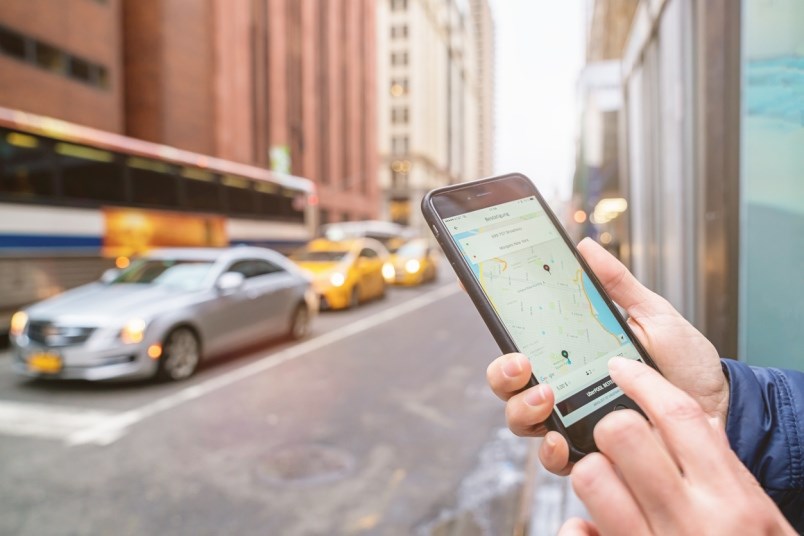Ride-hailing companies such as Uber and Lyft will be allowed in British Columbia by the fall of 2019, but they will be operating in a market so tightly controlled, critics question whether they’ll be able to thrive.
The provincial government introduced legislation to modernize B.C.’s taxi industry on Monday, but it remains unclear when the first ride-hailing vehicles will hit the road.
North Vancouver-Seymour Liberal MLA Jane Thornthwaite said the way the NDP keeps pumping the brakes on ride hailing is a “huge disappointment.”
“It’s bureaucracy upon bureaucracy,” she said, adding the government has done little to speed up ride hailing in B.C. “Bottom line is we don’t know when it’s coming or if it’s coming.”
Thornthwaite said the regulatory system announced Monday has so many rules that it will likely discourage ride hailing companies from setting up in B.C.
Under the regulations, “big government” will decide how many ride-hailing cars are allowed on the road, when and when they are allowed to travel and how much they should charge customers, said Thornthwaite. “These are all issues the market should be deciding,” she said. “This is the way it is everywhere else in the world. It’s a ridiculous piece of legislation that is going to make things worse.”
“I know the North Shore is not going to be pleased.”
Under the legislation introduced Monday, ride-hailing companies will be able to submit applications to the provincial Passenger Transportation Board in September 2019.
No ride-hailing vehicles will be on the road, however, until they’re covered by insurance, said Transportation Minister Clare Trevena.
The Insurance Corporation of B.C. has set a date for fall of 2019 to come up with a new type of insurance that would cover ride-hailing fleets.
If passed, the Passenger Transportation Amendment Act will give more power to the Passenger Transportation Board to set fares, make decisions on the number of licences and the boundaries in which both taxis and ride-hailing vehicles operate.
Under the NDP’s proposed system, drivers for ride hailing companies would also be required to have a Class 4 commercial drivers’ licence rather than the regular Class 5 licence.
Michael van Hemmen, who heads Uber’s Western Canadian operations, worried that caps on numbers of vehicles and controls on pricing could present a major roadblock to the company’s expansion into B.C. He said no other jurisdiction in Canada sets controls on pricing or vehicle supply. “Today raises a lot of questions about the future of ride sharing in B.C.”
The NDP government has faced criticism for being slow to open the door to ride-hailing, which is well established in other parts of the country.
Premier John Horgan promised before the May 2017 election that services such as Uber and Lyft would be operating by the end of that year.
North Vancouver-Lonsdale NDP MLA Bowinn Ma defended the government’s careful approach to ride hailing. Ma said one of the biggest concerns on the North Shore is traffic congestion. Studies indicate when ride hailing has been brought in to big cities without restrictions, “It impacts congestion,” she said. “It makes it a lot worse.”
Ma said one concern is the ride hailing tends to draw people away from public transit instead of away from private vehicles, so there end up being more vehicles on the road.
Price controls are also a way to limit “surge pricing” by ride hailing companies – the model used by Uber and Lyft under which prices increase dramatically during times of high demand, said Ma.
She added she does hear from North Vancouver constituents who are “very frustrated by the taxi service they are receiving. Taxi companies are not helping themselves with the level of service they are providing,” she said.
Thornthwaite said she hears often from people who are left stranded, including “young people who are walking home (from downtown Vancouver) at 2 a.m. across the Lions Gate Bridge because cabs will not take them home (to the North Shore),” she said.
Thornthwaite said it’s not uncommon to have to wait 45 minutes for a cab. “I’ve had to call them three times,” she said.
Tourists who come to the Lower Mainland are also mystified by the absence of ride hailing, she said. “They just don’t understand why it can’t be available here,” she said, adding, “(The NDP) are just dragging their feet for political reasons.”
– with files from Katie DeRosa/Times Colonist



